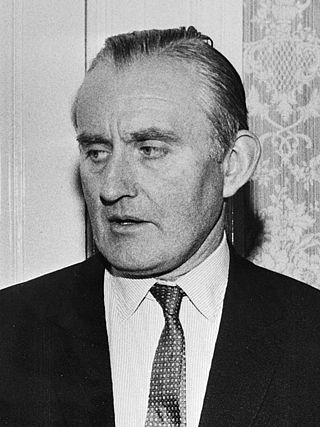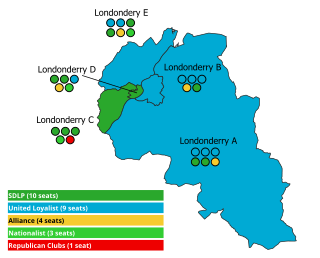Related Research Articles

The Ulster Unionist Party (UUP) is a unionist political party in Northern Ireland. The party was founded as the Ulster Unionist Council in 1905, emerging from the Irish Unionist Alliance in Ulster. Under Edward Carson, it led unionist opposition to the Irish Home Rule movement. Following the partition of Ireland, it was the governing party of Northern Ireland between 1921 and 1972. It was supported by most unionist voters throughout the conflict known as the Troubles, during which time it was often referred to as the Official Unionist Party (OUP).

The 1998 Northern Ireland Assembly election took place on Thursday, 25 June 1998. This was the first election to the new devolved Northern Ireland Assembly. Six members from each of Northern Ireland's eighteen Westminster Parliamentary constituencies were elected by single transferable vote, giving a total of 108 Members of the Legislative Assembly (MLAs).

James Henry Molyneaux, Baron Molyneaux of Killead, KBE, PC, often known as Jim Molyneaux, was a unionist politician from Northern Ireland who served as leader of the Ulster Unionist Party (UUP) from 1979 to 1995, and as the Member of Parliament (MP) for South Antrim from 1970 to 1983, and later Lagan Valley from 1983 to 1997. An Orangeman, he was also Sovereign Grand Master of the Royal Black Institution from 1971 to 1995, and a leading member of the Conservative Monday Club.
Arthur Brian Deane Faulkner, Baron Faulkner of Downpatrick,, was the sixth and last Prime Minister of Northern Ireland, from March 1971 until his resignation in March 1972. He was also the chief executive of the short-lived Northern Ireland Executive during the first half of 1974.

James Dawson Chichester-Clark, Baron Moyola, PC, DL was the penultimate Prime Minister of Northern Ireland and eighth leader of the Ulster Unionist Party between 1969 and March 1971. He was Member of the Northern Ireland Parliament for South Londonderry for 12 years, beginning at the by-election to replace his grandmother, Dame Dehra Parker in 1960. He stopped being an MP when the Stormont Parliament was suspended and subsequently abolished with the introduction of Direct Rule by the British Government.
The Unionist Party of Northern Ireland was a political party founded by Brian Faulkner in September 1974.
John Warden Brooke, 2nd Viscount Brookeborough, PC (NI), was a Northern Irish politician. He was the son of the 1st Viscount Brookeborough, third Prime Minister of Northern Ireland.
The Ulster Liberal Party was a liberal and non-sectarian political party in Northern Ireland linked to the British Liberal Party. The party was officially neutral on the constitutional position of Northern Ireland. Members expressed different views on the issue but agreed that Northern Ireland could only join the Republic of Ireland if that was the wish of the majority of the people of Northern Ireland.
The Privy Council of Northern Ireland was a privy council advising the Governor of Northern Ireland in his role as viceroy of the British Crown, in particular in the exercise of the monarch's prerogative powers. The council was the successor within Northern Ireland of the Privy Council of Ireland, which offered advice to the Lord Lieutenant of Ireland.

Michael Nesbitt, MLA is a Northern Irish politician and former broadcaster currently serving as the Minister of Health since 28 May 2024. He will become the Leader of the Ulster Unionist Party (UUP) on 14 September 2024 following his successful candidacy in the 2024 leadership election after previously serving in the role from 2012 to 2017. Nebsitt has been a Member of the Northern Ireland Assembly (MLA) for Strangford since 2011.
William Stratton Mills is a retired solicitor and former politician in Northern Ireland.

Sir Richard Dawson Bates, 1st Baronet, known as Dawson Bates, was an Ulster Unionist Party (UUP) member of the House of Commons of Northern Ireland.
Sir William Victor McCleery was a prominent Unionist in Northern Ireland.
Robin John Bailie, PC (NI), is a Northern Irish solicitor and former politician.
North Down was a constituency of the Parliament of Northern Ireland.
William Douglas was a prominent unionist activist in Northern Ireland.
James Bailie (1890–1967) was a unionist politician in Northern Ireland.
Thomas Bailie was an Ulster Unionist Party (UUP) Member of Parliament (1941–1953) in the Parliament of Northern Ireland, based at Stormont, during which time he was Deputy Speaker.
The Ulster Unionist Party (UUP) was founded in Northern Ireland in 1905. Early leadership records are incomplete.

The 1973 Londonderry City Council election took place on 30 May 1973 to elect members of Londonderry City Council in Northern Ireland. This was on the same day as other Northern Irish local elections. The campaign was significant in that, following changes to the election process and districts, Irish nationalist parties were able to take control of the council for the first time.
References
- 1 2 John F. Harbinson, The Ulster Unionist Party, 1882-1973, pp.53-54
- ↑ "No. 2675". The Belfast Gazette . 1 January 1971. p. 1.